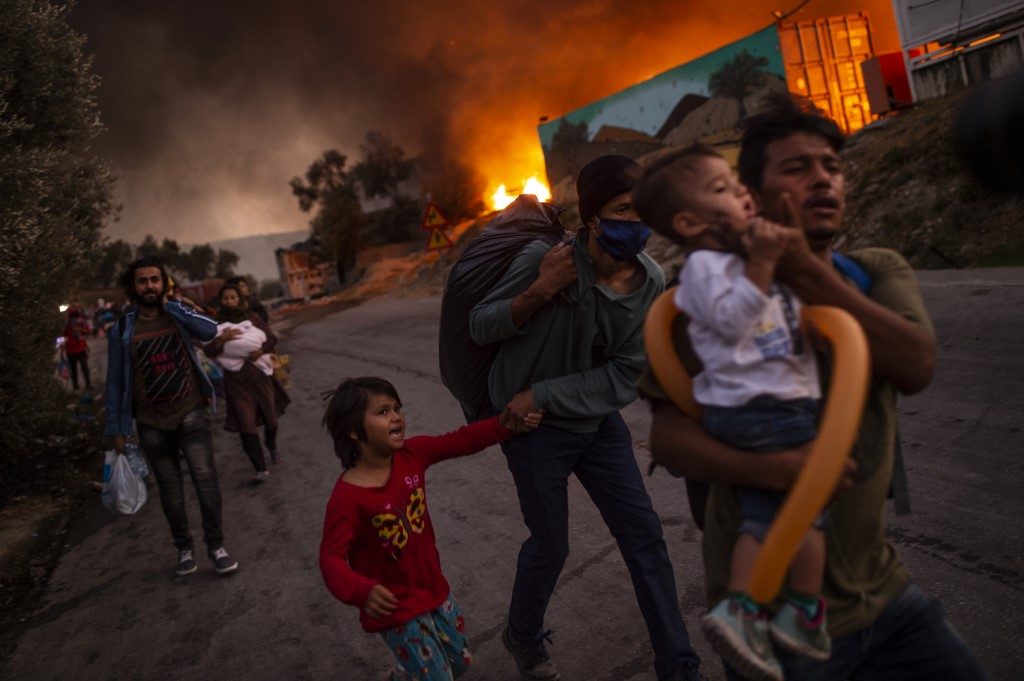SUMMARY
This is AI generated summarization, which may have errors. For context, always refer to the full article.

The European Commission launched an effort Wednesday, September 23, to rally skeptical member states around a plan to better share responsibility for settling refugees and sending rejected asylum seekers home.
The long-awaited proposal for a “New Pact on Migration and Asylum” comes two weeks after a devastating fire in an overcrowded camp on the Greek island of Lesbos, and 5 years after Europe’s last major migrant crisis.
It proposes that EU member states who do not want to volunteer to house more migrants – and reduce pressure on Italy and Greece, where most arrivals land – can instead take charge of sending those whose asylum requests are rejected back to their homelands.
“We want to live up to our values. And at the same time face the challenges of a globalized world,” the president of the European Commission, Ursula von der Leyen, said, warning that old system “no longer works”
The proposal disappointed migrants’ rights activists and refugee agencies, who had hoped for compulsory quotas for refugee settlement and an end to a “Fortress Europe” ringed by squalid refugee camps.
“It’s a compromise between xenophobia and cowardice,” tweeted professor of environmental geopolitics Francois Gemenne.
But the plan is likely, nevertheless, to face a rough reception in national capitals, many of which are keen to see the EU take ownership of the problem, without wanting to take charge of large numbers of refugees on their own soil.
“It won’t work like this,” Austrian Chancellor Sebastian Kurz told Agence France-Presse this week, rejecting the idea of mandatory quotas for refugees for all EU countries.
Poland, Hungary, the Czech Republic and Slovakia also oppose compulsory relocation, and torpedoed such plans after the 2015 migration crisis.
But von der Leyen had promised another ambitious plan, with an accelerated process to remove migrants who are unlikely to obtain protection.
Those coming from countries with a lower than 20% positive response rate to asylum applications, such as Tunisia or Morocco, will be processed at the border and within 12 weeks.
And if a country is subject to migratory “pressure,” and believes that it cannot take care of migrants, it can request the activation of a “compulsory solidarity mechanism” by the Commission.
All states will then be called upon to contribute, according to their economic weight and population, but they will have the choice between receiving asylum seekers, “sponsoring” the return of a migrant who does not have the right to stay or helping to build reception centers.
‘Long live Dublin’
In the event of a crisis similar to that in 2015 – when more than a million refugees arrived, compared to only 140,000 per year now – the choice for a state is reduced to taking charge of the relocation of refugees or the return of rejected migrants.
But if an EU country fails to return migrants to their country of origin within 8 months, it must take them in – an idea that a European source admitted would be hard for smaller countries to accept.
Von der Leyen said last week the proposal would replace the “Dublin Regulation” with “a new European migration governance system.”
The Dublin Regulation states that asylum claims must be processed by the migrant’s country of arrival, a rule that has led to bitter squabbles between the southern coastal member states where seaborne migrants arrive, and wealthier northern countries where most prefer to head.
In the Commission’s proposal, the country responsible for the application could be the nation in which a migrant has a brother or sister or in which he or she has worked or studied. Any country that issued a visa to a migrant will have to take care of any asylum application.
Otherwise, however, the country of arrival is still responsible.
Observers said the plan as unveiled maintains more or less the same principle as Dublin, with some flexibility.
“It all looks like window dressing, it’s more or less Dublin is dead, long live Dublin,” said migration researcher Yves Pascouau of the Jacques Delors Institute.
Marissa Ryan of aid agency Oxfam said the plan “bowed to pressure from EU governments whose only objective is to decrease the number of people granted protection in Europe.”
The fire in the Moria camp, which underlined the dismal state of the system for housing refugees stuck on the Greek islands, has focused attention again on migrants.
But offers to rehouse the now homeless Moria refugees have come piecemeal, with some states like Austria refusing point blank to take any. – Rappler.com
Add a comment
How does this make you feel?
There are no comments yet. Add your comment to start the conversation.